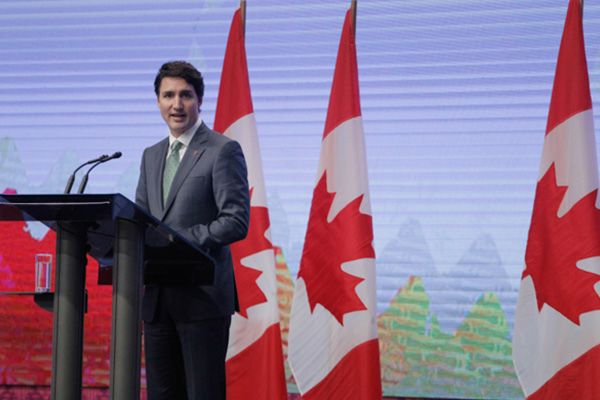Trudeau raises EJK; Duterte insulted

In a press conference at the International Media Center, Trudeau revealed he discussed the longstanding issue of Canada dumping garbage in the country with President Rodrigo Duterte. File
MANILA, Philippines — Canadian Prime Minister Justin Trudeau discussed the extrajudicial killings and other human rights issues in the Philippines during an informal talk with President Duterte on the last day of the 31st Association of Southeast Asian Nations (ASEAN) Summit and Related Meetings yesterday.
Trudeau said Duterte was “receptive,” but the Philippine President said last night that he considered it “a very serious… personal and official insult.”
“I will never ever allow a foreigner to question me… I will not explain,” Duterte told a media briefing at the end of the summnit last night. “You are a foreigner… you do not know what is happening in this country.”
He urged foreign critics to conduct their own investigation as he said the government must be given the benefit of the doubt and “the simple right to be heard.”
In a press conference with local and foreign media, Trudeau said he talked with Duterte about the need to respect the rule of law and admitted that Canada’s human rights record is also not perfect.
Thousands of suspects,
including teenagers, have been killed under the Duterte administration’s war against drugs.
“As I mentioned to President Duterte, we are concerned with human rights, the extrajudicial killings. I impressed upon him the need to respect the rule of law and, as always, offered Canada’s support and help as a friend to help move forward on what is a real challenge,” Trudeau said.
“This is the way we engage with the world, and this is the way we always will,” he added.
Duterte is known to be sensitive to criticisms. But Trudeau said Duterte was “receptive” when the issue of extrajudicial killings was raised during their talk.
At the media briefing last night, Duterte was asked about Trudeau’s concern. Duterte replied, “I was elected by the people of the Republic of the Philippines. I only answer to the people of the Republic of the Philippines.”
Presidential spokesman Harry Roque said Trudeau may have brought the human rights issue privately since there was no mention of such concern in public meetings.
Trudeau also explained Canada’s strong stance on human rights, citing its concern expressed on the Rohingya crisis in Myanmar.
“Canada is a country that always brings up human rights issues and strongly engages in line with our values everywhere around the world. Countries around the world have learned to accept and expect that of Canada even as we engage constructively on other ways on economics, trade and benefits for our people,” he said.
Trudeau expressed Canada’s willingness to help other nations in the areas of justice system, policing and governance.
“These are things that Canada can share best practices and help countries move along in a way that creates opportunities, stability and security for their citizens,” he said.
Canada might take back its garbage
Trudeau said he also discussed with Duterte the tons of garbage that Canada dumped in the Philippines.
“I committed to him, as I am committing to you all now, that Canada is very much engaged in finding a solution on that,” Trudeau said at a press conference at the ASEAN International Media Center in Pasay City.
When Trudeau first visited the Philippines in 2015 for the Asia-Pacific Economic Cooperation Summit, he reportedly skirted the issue when asked whether Canada would take back its trash. He then only said that he was “made aware” of the situation.
Trudeau yesterday explained that Canada’s own regulations prevented them from taking back their garbage even though the trash originated from Canada.
Now that the legal impediments have been resolved, “it is now theoretically possible to take it back,” he said.
But the Canadian leader said there are issues that have to be settled, like who will pay for shipping the garbage back and who will be held responsible for the garbage mess.
He explained the shipping of garbage was a commercial transaction that did not involve the governments of Canada or the Philippines.
Around 103 container vans containing garbage from Canada arrived in the country between 2013 and early 2014 under the guise of recycling.
The shipping containers with garbage that arrived at the Manila International Container Port were exported by Demetrios Jim Makris of Chronic Inc. between 2013 and 2014. The importers were Live Green Enterprises and Chronic Plastics Inc.
About half of the trash was reportedly dumped in Capas, Tarlac.
Chronic Plastics Inc. is facing charges for violation of Republic Act 9003 or the Ecological Solid Waste Management Act and the 1995 Basel Convention on the Transboundary Movement of Hazardous Wastes and Disposal.
Greenpeace Southeast Asia on Monday hit Trudeau’s “public relations antics,” saying these “cannot cover the stinking Canadian waste issue as long as it is left rotting on our ports.”
Two officials of the Catholic Bishops’ Conference of the Philippines (CBCP) said the Philippine government should again raise with Trudeau the trash dumped by Canada to the Philippines.
Manila Auxiliary Bishop Broderick Pabillo said the Philippine government should demand the Canadian government take back its garbage.
Fr. Edu Gariguez, executive secretary of the CBCP’s social arm National Secretariat for Social Action, said Canada’s garbage was mentioned to Trudeau when he first visited the country in 2015, so Trudeau should have come up with a plan on how to take back the garbage.
Justice for 2 beheaded Canadians
Trudeau vowed to continue seeking justice for the two Canadians beheaded by the Abu Sayyaf as he renewed his commitment to join the global fight against terrorism.
Canadians John Ridsdel and Robert Hall along with Norwegian resort manager Kjartan Sekkingstad and Filipina Maritess Flor were kidnapped by about 20 armed men at the Ocean View Resort in Samal Island off Davao Oriental in 2015. – Pia Lee-Brago Helen Flores, Alexis Romero, Christina Mendez, Evelyn Macairan
- Latest
- Trending





























